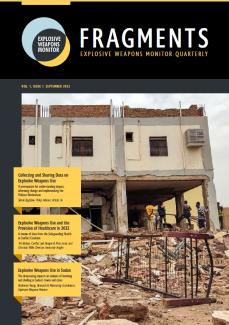Vol. 1, Issue 1, 2023

DOWNLOAD VOL. 1, ISSUE 1, 2023
In this issue:
1. Collecting and Sharing Data on Explosive Weapons Use
A prerequisite for understanding impact, informing change and implementing the Political Declaration
Simon Bagshaw, Policy Advisor, Article 36
The importance of collecting data on the impact of explosive weapons on civilians and civilian objects is firmly recognized in the Political Declaration on Strengthening the Protection of Civilians from the Humanitarian Consequences Arising from the Use of Explosive Weapons in Populated Areas that was adopted and endorsed by 83 states in November 2022. This article examines the Declaration’s commitments on data collection and suggests practical steps for their implementation by endorser states.
2. Impact of Explosive Weapons Use on the Provision of Healthcare in 2022
A review of data from the Safeguarding Health in Conflict Coalition
Tim Bishop, Conflict and Hunger & Press Lead, and Christina Wille, Director, Insecurity Insight
The Safeguarding Health in Conflict Coalition reported at least 634 attacks on healthcare in which explosive weapons were used in 2022. This data, collected by Insecurity Insight, shows the widespread disruption of the provision of healthcare across the globe as a result of the use of explosive weapons in populated areas, the full scope of which will extend long beyond the time and location in which they were recorded. Ongoing data collection on civilian harm from the use of explosive weapons remains critically important to supporting efforts to address and mitigate this harm.
3. Explosive Weapons Use in Sudan
The devastating impacts on civilians of bombing and shelling in Sudan’s towns and cities
Katherine Young, Research & Monitoring Coordinator, Explosive Weapons Monitor
Since 15 April 2023, the Sudan Armed Forces (SAF) and Rapid Support Forces (RSF) have used explosive weapons in towns and cities in Sudan that have killed and injured civilians, damaged and destroyed civilian infrastructure, and disrupted services essential to the lives and well-being of civilians. As a result, civilians live with a dangerous shortage of food and water, unreliable access to electricity, impeded access to healthcare and widespread displacement. To prevent this foreseeable pattern of harm and mitigate risk to civilians, armed forces and groups in Sudan – and elsewhere – must avoid the use of explosive weapons in populated areas.